"The fear of the Lord is the beginning of [political] wisdom"
Reflections on chapter 4 of Hazony's Conservatism: A Rediscovery
In chapter 4 of Conservatism, Hazony explores the nature of political order through four ideas and institutions: God, Scripture, family, and congregation. These historically “have given Jewish and Christian societies their particular form” (p.190).
Hazony’s key move here is to relate ethical monotheism to epistemic humility and then explore the consequences for political society. If there is indeed one God who maintains an abiding interest in man’s everyday conduct and ultimate destiny, as the Bible posits, then there is “one normative order, only one standard for judging what is true and right” (p.191).
Such ethical monotheism induces, not a sense of moral superiority, but its opposite: awe and humility—what the biblical authors call the “fear of the Lord.” It’s an intellectual and spiritual posture that affirms both revelation and reason as guides to truth. It also means that human knowledge is necessarily partial and fallible. The biblical worldview thus “see[s] the need to embrace a plurality of viewpoints, at times in conflict with one another, since what the individual can know is limited and truth emerges only in time” (p.199).
Hazony is here treading well-worn paths. Paul’s sermon on the Areopagus embodies this tension between universality and particularity, the oneness of God and the plurality of nations:
[God] made from one man every nation of mankind to live on all the face of the earth, having determined allotted periods and the boundaries of their dwelling place, that they should seek God, and perhaps feel their way toward him and find him. Yet he is actually not far from each one of us…. (Acts 17:26-27)
For Paul, distinctions among nations and the partiality of human knowledge are part of God’s plan. They’re features of the created order, not bugs, designed to make us seek after God.
Andrew Walker makes a similar argument in his book Liberty for All: Defending Everyone’s Religious Freedom in a Pluralistic Age. Between the fall and the age to come, we live in what Walker calls an “age of contestability” characterized by divergent beliefs and competing claims of truth and authority. This demands a “posture of humility toward religious diversity”—in a phrase, religious freedom—as individuals, communities, and whole nations feel their way toward God.
So it is that ethical monotheism induces epistemic humility and leads us to embrace plurality.
Yet Hazonian conservatism is not Lockean liberalism. So why Hazony’s philosophical emphasis on “a plurality of viewpoints”? It is not because Hazony advocates a society where every individual pursues happiness in the Jeffersonian mode. Rather, Hazony wants to elevate our respect for inherited national traditions. For Hazony, it is the building up and strengthening of one’s own nation—through the transmission and repair of its distinct traditions—that is the proper focus of a conservative politics.


